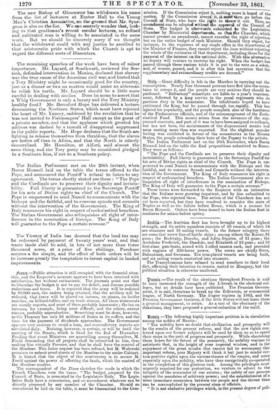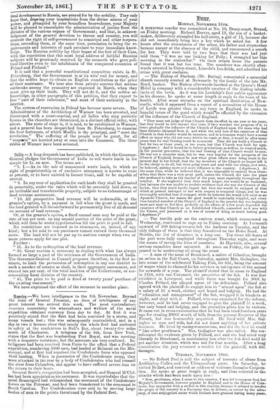" The nobility have no doubt that civilization and prosperity
will be the results of the present reform, and that the new rights con- ferred upon our former subjects will be used by them so as to speed their steps in the path of progress and prosperity. While cherishing these hopes for the future of the peasantry, the nobility venture to anticipate that, in the height of your imperial wisdom, and in the enjoyment of the great results that cannot fail to accompany this important reform, your Majesty will think it but just to confer cer- tain positive rights upon the various classes of the empire, and more especially upon the. nobility, who have thus energetically co-operated in the completion of this glorious task. Amoug the privileges most urgently required for our protection, we venture to advert to the integrity of the remainder of our estates ; the safety of our persons against the mandates of arbitrary power; and the establishment of a more immediate connexion between the people and the throne than can be accomplished by the present class of officials.
" It is not exclusive privileges which, in the present degree of poli- tical development in Russia, are prayed for by the nobility. They only hope that, drawing your inspirations from the divine source of your
wer, and prompted by your boundless benevolence, your Majesty will be pleared to emancipate the administration of justice from the dictates of the various organs of Government; and that, in acknow- ledgment of the general devotion to throne and country, you will concede the right of self-government to municipal and other corpora- tions, according them, at the same time, permission to bring the re- quirements and interests of each province to your immediate know- ledge. The Russian nobility lay their hopes at the feet of their Czar, with the conviction that this most loyal address of faithful Russian subjects will be graciously received by the monarch who gave poli- tiolliberties even to the inhabitants of the conquered countries of Poland and Finland."
It is said that a powerful constitutional committee exists in St. Petersburg, that the Government is at its wits' end for money, and that the nobles hope to obtain an English constitution as the price of their assistance. We hear also from private sources that serious outbreaks among the peasantry are expected in March, when they must give up their lands. They will not do it, and the nobles ac- knowledge, in other paragraphs of this petition, that they expect to lose "part of their substance," and most of their authority in the interior.
The system of repression in Poland has become more severe. The Administrator of the Archbishop of Warsaw has been arrested, and threatened with a court-martial, and all ladies who sing patriotic hymns in the churches are threatened, in a distinct official order, with arrest. The state of siege is, it is said, to be established in Warsaw, and a general has been despatched from St. Petersburg, to examine the four fortresses, of which Modlin is the principal, and " meet the revolution." The suffering of the people must be great, for all "suspects" are hurried away at once Into the Caucasus. The three rabbis of Warsaw have been arrested.































 Previous page
Previous page